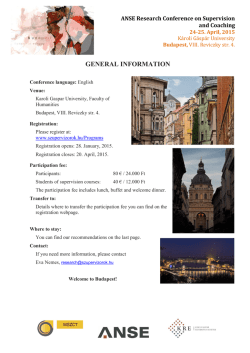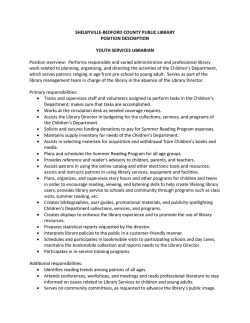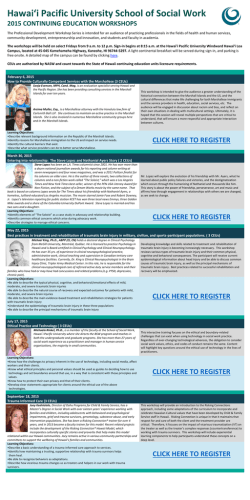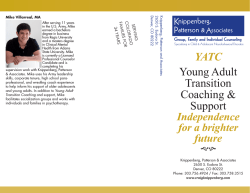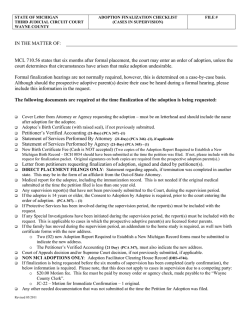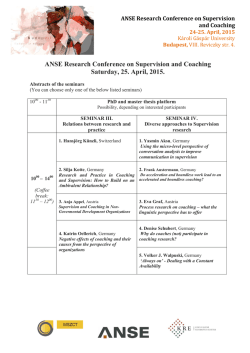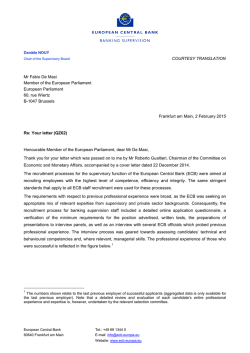
ANSE Research Conference on Supervision and Coaching Friday
ANSE Research Conference on Supervision and Coaching 24-25. April, 2015 Károli Gáspár University Budapest, VIII. Reviczky str. 4. ANSE Research Conference on Supervision and Coaching Friday afternoon, 24. April, 2015. Abstracts of the seminars (You can choose only one of the below listed seminars) SEMINAR I. Development of supervision and coaching SEMINAR II. Experiences in the world of labour 1. Brigitte Schigl, Austria 1. Nora Alsdorf, Germany The Complexity of Supervision Generation specific Dynamics in Research: Risks and Side effects of Organizations Supervision 2. Carmen Wolf , Germany 2. Ola Ravndal Bjørnestad, Norway Recognizing pattern states in coaching Supervisory challenges in Norwegian public and changing them in self-e-coaching healthcare surroundings 1500 - 1830 (Coffee break: 1630 – 1700) 3. Jan Lohl, Germany History of Early European Supervision 3. Kurt Gottfried, Switzerland Multidisciplinary units perceive clinical supervision in psychiatric hospitals and about the effects of supervision 4. Tone Haugs, Norway The use of Essay as a tool in supervisors professional development 4. Kristine Martinsone, Latvia Supervision in different professional groups in Latvia: results of a pilot study 5. Heidmarie Müller-Riedlhuber, Austria Policy aspects. An European perspective on Supervision/Coaching 5. Brigita Rupar, Slovenia Effects of the Supervision Process on Teachers’ Self-regulation WORKSHOP 00 30 17 - 18 Jutta Müller, Dirk Bayas-Linke, Elmar Schwedhelm, Germany The potential of video-interaction-analysis in coaching and consulting of teams ANSE Research Conference on Supervision and Coaching 24-25. April, 2015 Károli Gáspár University Budapest, VIII. Reviczky str. 4. Abstracts of the seminars on Friday, 24. April 2015 SEMINAR I. Development of supervision and coaching 1. Brigitte Schigl, Austria - The Complexity of Supervision Research: Risks and Side effects of Supervision General theme: Multi-method and Multi-perspectives on a complex field: Lecture: The Complexity of Supervision Research: Risks and Side effects of Supervision (Schigl Brigitte) This presentation is the synoptic result of different research-methods on the topic of risks, side effects and damages of supervision. Qualitative and quantiative data has been collected from different perspectives ( Supervisors, Supervisees, Articles). They showed some alarming results, which should be noticed by all of those who offer supervision. Poster: Research Methods and Results of Masterthesis on Supervision-Subjects (Artner Noah & Schigl Brigitte) The Poster gives an overview of the themes and main results of master-thesis research projects, which have been realised by students of the MSc.-Course of Supervision and Coaching at the Danube University of Krems /Austria. The research has been conducted by qualitative and quantiative methods and shows a broad range of perspectives in different fields of supervision. Contact: Prof. Dr. Brigitte Schigl Danube University Krems, Department for Psychotherapy and bio-psycho-social Health. MSc.-Degree course in Supervision and Coaching Mail: brigitte [email protected] ANSE Research Conference on Supervision and Coaching 24-25. April, 2015 Károli Gáspár University Budapest, VIII. Reviczky str. 4. 2. Carmen Wolf, Germany - Recognizing pattern states in coaching and changing them in self-e-coaching Leading dual questions: How can we improve research on professional practice and How could professional practicioners learn from it and put the results to good use? The current market of coaching is characterized by a wide variety of offers with different coaching concepts, various topics, and formats. Under the impact of coaching and after transferring coaching from a limited professional sector to the private sector, the target group changed: Whereas coaching in the past addressed executives/managers/leaders and special qualified employees, coaching now is offered to almost anyone and for any problem. But not every coaching offer really covers coaching, because the term of coaching is not protected. This is why organizations like the German Federal Association for Executive Coaching (DBVC) try to standardize the use of the term and provide orientation for coaches as well as for clients or potential clients. Professionalism in coaching is defined very broadly, with this definition covering individually varying understandings of professionalism and no strict and binding commitment to and understanding of standards (Schmidt-Lellek, 2012, p. 11). This situation leads to confusion of potential clients. Quality issues are raised and blurred borders between coaching and other methods may end up in an irrevocable damage of the coaching market. While the e-coaching market is growing, interest of serious and professional providers of coaching services in standards and clear definitions of formats is further increasing. Offers on the e-coaching market may be named online coaching, tele coaching, virtual coaching or web-based coaching. When speaking about coaching, a special type is often mentioned very briefly only: Self-coaching. It means coaching without a professional coach controlling the process. Absence of a coach is a particular challenge not only in paper-based coaching, but also in e-coaching. It is a problem when concepts focusing on solutions and based on emotions are to be realized. Systemic solution-oriented coaching of the Karlsruher Schule is based mainly on the so-called change of pattern state. This means the transition from the problem state to the solution state to support the individual solution-finding process by evoking good feelings of having reached the desired objective already. Although the change of pattern state is mentioned occasionally in literature (with different names), very little information is provided with respect to self-coaching or self-e-coaching. This will be one of the major challenges to face concerning self-e-coaching. At the conference, we will address the question how the change of pattern state can be implemented in ecoaching without any interventions by a professional coach? Research into the change of the pattern state using the concept of the Karlsruher Schule will be discussed with particular attention being paid to e-coaching and coaching without a coach. More information: http://www.ibap.kit.edu/berufspaedagogik/mitarbeiter_928.php Author: Carmen Wolf, M.A. ([email protected]) Literature Berninger-Schäfer, E., & Wolf, C. (2012). Qualitätssicherung im Coaching – Was sich die Praxis und die Forschung wünscht. In E.-M. Graf, Y. Aksu, I. Pick, & S. Rettinger (Hrsg.), Beratung, Coaching, Supervision. Multidiziplinäre Perspektiven vernetzt. (pp. 83-96). Wiesbaden: VS Verlag. ANSE Research Conference on Supervision and Coaching 24-25. April, 2015 Károli Gáspár University Budapest, VIII. Reviczky str. 4. Schmidt-Lellek, Christoph (2012). The Development of Coaching as a Profession. In: Deutscher Bundesverband Coaching e.V. (DBVC; German Federal Association for Executive Coaching) (Ed., 2012). Guidelines and Recommendations on the Development of Coaching as a Profession. Osnabrück: Steinbacher Druck, pp. 11-17. Retrieved from: http://www.dbvc.de/fileadmin/user_upload/dokumente/Englisches_Kompendium/DBVCKompendium_englisch.pdf (June 28, 2013). Wolf, Carmen (2013). Assistenz- und Feedbacksystem zur Unterstützung ergebnisorientierter Selbstreflexion. LEARNTEC 2013, 31.01.2013, Karlsruhe. URL: http://www.ibap.kit.edu/berufspaedagogik/download/20120121_Wolf_Feedback-_und_Assistenzsystem.pdf (February 18, 2014). Wolf, Carmen (2013). Musterzustandsänderung – Hintergrund, Konzept, Wirkung. Karlsruhe: Führungsakademie Baden-Württemberg. [not published final paper] Wolf, Carmen (2014). Musterzustände im Coaching erkennen und verändern (Recognize pattern states in coaching and changing them). [to be published soon] Wolf, Carmen (2014). Musterzustandsänderung – Hintergrund, Konzept, Wirkung. 1. Karlsruher Wissenschaftsforum Coaching, 14.02.2014, Karlsruhe. URL: https://fueak.bw21.de/Documents/Mitteilungen/2013/Einladung%20Karlsruher%20Wissenschaftsforum%20Coa ching.pdf (February 18, 2014). ANSE Research Conference on Supervision and Coaching 24-25. April, 2015 Károli Gáspár University Budapest, VIII. Reviczky str. 4. 3. Jan Lohl, Germany - History of Early European Supervision Supervision - History - Change. Report from an ongoing research project Abstract for a lecture by Dr. Jan Lohl* Supervision in its present form has an eventful history. It is astonishing that the history of supervision in Germany is so far predominantly explored in a way referring to the history of theory, of terms and of methods, whereas it has not yet been researched in a social and political context. This situation caused the “Deutsche Gesellschaft für Supervision” (DGSv; German Association for Supervision) in cooperation with the Sigmund-Freud-Institute (Frankfurt am Main) to run a research project dealing with the history of supervision in Germany. The research project analyses the history of supervision in Germany from a protagonist perspective: Based on interviews with supervisors (research methods: grounded theory, oral history, narrative interviews, depth hermeneutic, documentary method) the history of supervision can be reconstructed from „the bottom up“ and it can be presented from a daily life perspective. Basic assumption of the project is, that the history of supervision must be understood as a part of political and social processes. The lecture gives insight into the research methods and in intermediate results. It focuses on the history of supervision in the 1970s, which has a special significance in the cultural memory of supervision: Supervision in Germany has become politicized in this time. There were conflicts and debates on issues such as authority and power, participation and democratization. Based on selected research data the lecture clarifies, how supervisors have experienced this time and its conflicts. From here the lecture draws a line between this past and the present of supervision. It shows, how past experiences influences the professional identity and the practice of supervisors and asks for the further development of supervision. * Jan Lohl is senior researcher at „Sigmund-Freud-Institut. Research institut for psychoanalysis and its applications“ (Frankfurt am Main) and working as Supervisor and Coach, mail to [email protected] ANSE Research Conference on Supervision and Coaching 24-25. April, 2015 Károli Gáspár University Budapest, VIII. Reviczky str. 4. 4. Tone Haugs, Norway - The use of Essay as a tool in supervisors professional development Writing an essay about their view on human beings (menneskesyn), can be a useful tool in supervisors professional development. To put an emphasize on personal formation (bildung), seems to give the students of supervison the possibility to acknowledge and challenge their own professional work, and through that, strengthen their competence to supervise professionals. The students are asked to write an essay and reflect on their personal view on human beings and ask themselves whether, or how, they manage to work in coherence with a humanistic view on human beings in their daily working life. Professional studies in Norway on a BA level, put an emphasize on both ethics and theory that put forward an understanding of the value of a humanistic framework for professional work. Professionals meet in their daily work, a reality that challenges their personal standard of ethics, and they have to deal with situation where the dignity of their patients or clients are threatened. Managing to stay in coherence with ones own working values, seem to be of importance to prevent burnout. An interest in burnout syndrome and job fatigue, reports to be one of the reasons why students wish to be educated supervisors. We search to deal with this topic in a way that is personally challenging for the students. The aim of the essay is to give students of supervision a possibility to acknowledge their practical reality and a get a greater understanding of the necessary changes that possibly need to be made. To be accepted into the supervision course at MA level, the students must have a BA degree in professional studies, and two years of practical experience from the health or social field, school, police or likewise. They bring with them the questions, the practical dilemmas and the good and bad experience from their own professional field. Through the education, the students are provided with a possibility to actively engage in forming their own goals for their learning and professional formation, within the frame of the supervision course. One of our former students points out; “Taking the course in supervision, and having to write an essay which implied to reflect on the theoretical base upon my own view of human beings, helped me to see more clearly when and how the use of power can be acceptable and when not. The importance of the professional interventions became more clear, and I was left with a more positive attitude towards my own profession as childcare taker”. She is, at the present, supervising childcare professionals. The essay seems to be one way to provide the students of supervision, on a MA level, with a professional tool in their own further professional development. They report to become more aware of the importance of making their implicit values and view on human beings, explicit, and to be able restore their supervisie to consciousness in the next run. The abstract aim to present an ongoing research to understand how, or whether our students develop their professional self reflection through writing essay. We want to learn more about a pedagogical tool. Research method is qualitative, and rely on hermeneutic reading of students essays. In addition the students are interviewed about their experience. The paper in process, aim to share our experience of using essay as a pedagogical tool in professional training of supervisors. References: Barbosa da Silva,A. mfl (2007)”Etikk og menneskesyn i helsetjeneste og sosialt arbeid”, Gyldendal Akademisk ANSE Research Conference on Supervision and Coaching 24-25. April, 2015 Károli Gáspár University Budapest, VIII. Reviczky str. 4. 5. Heidmarie Müller-Riedlhuber, Austria - Policy aspects. An European perspective on Supervision/Coaching ANSE Research Conference on Supervision and Coaching 24-25. April, 2015 Károli Gáspár University Budapest, VIII. Reviczky str. 4. SEMINAR II. Experiences in the world of labour 1. Nora Alsdorf, Germany - Generation specific Dynamics in Organizations The changing work environment of the postmodern times also influences the relationship between the generations. Flexibility and the pressure of ongoing innovations became new challenges for employees. By the research „work and life in organizations 2011“ the interviewed Supervisors defined different kinds of young employees which obviously differ in their attitude towards their profession and their abbility to self care: the pramatist, the (blind) actionist, and the idealist are building the three maincategories. (Dipl. Soz. Nora Alsdorf Psychoanalyse und Gesellschaft Sigmund-Freud-Institut Beethovenplatz 1-3 60325 Frankfurt am Main Tel.: 0049 69 971 204 134 Mail: [email protected] Website: www.sigmund-freud-institut.de) ANSE Research Conference on Supervision and Coaching 24-25. April, 2015 Károli Gáspár University Budapest, VIII. Reviczky str. 4. 2. Ola Ravndal Bjørnestad, Norway - Supervisory challenges in Norwegian public healthcare surroundings As a result of never ending increased spending on public healthcare, the Norwegian Government implemented the cooperation-reform from 01.01.2012. The reform is supposed to transfer a wide range of healthcare services from expensive state-hospital services to less expensive municipality-based services. In a qualitative case-study related to my master`s piece in Change Management at the University of Stavanger, sping 2014, top level bureaucrats from Stavanger Municipality, bureaucrats from Stavanger University Hospital and experienced hospital medicates were interwievd about the implementation of the reform and what view they have on the reform in general. In special two economical incentives were investigated. The teoretical frame for the investigation is to analyze the findings from both instrumental and professionals culture perspective. The findings are divided. The bureaucrats in Stavanger Municipality follws the state reform in a loyal manner. New municipality based health-services are beeing started and a formal law-based cooperation with Stavanger University Hospital is implemented. On the other hand Stavanger University Hospital also safeguard statutory at the same time as medicates don`t know anything about the hospital cooperation with the municipality and have no knowledge about the new municipality based healt-services. The medicates interwieved all expresses that the most important issue for them is the possibility to work with specialized healthcare and research whitin the specialized ereas of medicine. Regarding to the econonomical icnetives the psycisians only care about it if the incentives are matching with their aim to get patients faster out of the hospital, mainly older people who can be transfered to nursing-institutions. Otherwise the medicates have no interest in acting in compliance with the cooperation-reform. All in all the study concludes cultural aspects must not be underestimated if one wants success with a health reform. The cultur variable has not been included in planning and implementation of the cooperation-reform. Quantitative data shows us expenses to both municipality and state based health services are rising just as much as before the reform. In the wake of the case study one can ask how supervision can provide input to intelligent future healthcare-reforms. One possible answer is a pragmatic approach both to health care as a whole, but also to the different people working there, both bureaucrats and medicates. Through supervision this knowledge of culture can become known, and more intelligente healthcare reform can be made possible. This, though, is an research-area yet to be developed further. Ola Ravndal Bjørnestad [[email protected]], Norway ANSE Research Conference on Supervision and Coaching 24-25. April, 2015 Károli Gáspár University Budapest, VIII. Reviczky str. 4. 3. Kurt Gottfried, Switzerland - Multidisciplinary units perceive clinical supervision in psychiatric hospitals and about the effects of supervision Background: Little is known about the way multidisciplinary units perceive clinical supervision in psychiatric hospitals and about the effects of supervision. Objective: The main objective of this survey was to evaluate the experienced benefits and the 'side effects' of supervision. Another aim of the study was to investigate expected benefits and risks in supervision sessions analyzing comments of staff members. Methods: in a retrospective design staff members (e.g. nurses, doctors, counselors, psychologists) in psychiatric hospitals in Switzerland, Austria and Germany were asked about their experiences with supervision in the past six months prior interview. Comments were analyzed by a qualitative method. The sample was divided in two groups: staff members with case supervision (CS) or with team supervision (TS). A total sample of 1150 participants answered a semi-structured questionnaire. The response rate was 39,1%. Results: Overall 85% perceived supervision as helpful and 5.6% reported good and very good effects through supervision. However, 19.6% reported negative effects or critical incidents in at least one supervision session during the past six months. In general a high level of personal performance and competence of supervisors was reported. Case supervision was perceived as more helpful than team supervision. Qualitative analyses showed three major factors of supervision quality items: ‘burnout prevention’, ‘problem or conflict solving’, and ‘improvement of communication between staff members’. The most important factor was the perceived burnout prophylactic effect of supervision in both settings (CS and TS). Conclusions: The present study is the largest survey conducted in Europe. The major part of multidisciplinary units perceive supervision (CS and TS) as helpful and effective. However, case supervision (CS) seems to be perceived as more helpful in psychiatric hospitals than team supervision (TS). Furthermore, supervision seems to have a high ‘burnout prevention’ effect. Supervision in psychiatry is a very powerful instrument to recognize burnout phenomena and prevent them. It also helps staff and patients to create better therapeutic relations, dignity, respect and show courtesy between them. Finally, an academic formation as a psychologist, doctor or in pedagogy, combined with a supervisor formation and a formation in psychotherapy seems to be the best condition for high quality standards in supervision. ANSE Research Conference on Supervision and Coaching 24-25. April, 2015 Károli Gáspár University Budapest, VIII. Reviczky str. 4. 4. Kristine Martinsone, Latvia – Supervision in different professional groups in Latvia: results of a pilot study Supervision in Latvia has been evolving for more than 10 years. Since late last century it has been quite widely available for helping professionals: psychologists, psychotherapists, art therapists, and in recent years it is offered in other fields: business, career counselling, teaching, law, public administration, etc. In 2006, supervision was included in the Law on Social Services and Social Assistance as mandatory for social workers. In 2013, the Terminology Commission of the Latvian Academy of Sciences approved Latvian terms for 'supervision' and 'supervisor'. There are two dissertations, both in pedagogy, about the importance of supervision, its application possibilities and output (Āboliņa, 2012, Truskovska, 2013). However, as an independent profession under ANSE guidelines, supervision is developing relatively recently. In 2014, the supervisor was approved as a new profession in the Latvian profession classifier, which allowed licensing and launching of the Master's program "Supervision" at Rīga Stradiņš University, and the Latvian Association of Supervisors then defined the quality requirements for education and practice, as well as initiated the certification of supervisors. Thus, supervision in Latvia exists as interdisciplinary activity with different understanding of it in each professional field. Currently, the path to securing the supervisor as an independent profession is underway with clearly defined competencies, quality criteria and certification, as well as the laws and regulations (Mārtinsone, Mihailovs, 2014). To explore how supervision is understood and applied in different professions, there was conducted a semi-structured interview with number of questions about its practice and education, as well as the main theoretical approaches that are being used. The interview was attended by 16 experts with professional experience of more than 5 years at the field: 1 social worker, 2 psychologists, 2 psychotherapists, 2 art therapists, 3 lawyers, 3 teachers, 3 civil servants. The interview revealed: most lawyers, teachers, civil servants "have heard" about the possibilities and positive potential of supervision, but supervisions do not take place for lack of funding, regulation and uniform requirements for conduct of the supervisor in the field; and supervision is not a subject of professional studies or development. Supervision does take place in social work, psychology, psychotherapy, art therapy, and is included in respective study programs, but there exist different requirements for amount and form of supervision, as well as education and initiation of supervisor's professional activities. Various theoretical concepts of supervision are being used due to training and experience of existing supervisors, as well as existing professional traditions. In different fields there are different views and approaches to education and conduct of supervision, but common is the recognition of supervision's positive impact on the professionals and the environment / organizations. By studying supervisor as an independent profession (with education according to professional standards and subsequent certification and recertification), there was defined a clear need for dialogue between the professions on the kinds of supervisors that might be required and approved in various environments, with understanding of the specificity of each field. ANSE Research Conference on Supervision and Coaching 24-25. April, 2015 Károli Gáspár University Budapest, VIII. Reviczky str. 4. 5. Brigita Rupar, Slovenia - Effects of the Supervision Process on Teachers’ Self-regulation The aim of the study was to investigate the degree to which the participation in the supervision process affects teachers' reflective and emotional efficiency, whether it affects their increased use of active strategies for coping with stressful situations, and the degree to which it raises their awareness of what tasks are essential with regard to the achievement of educational outcomes.In this study there were includedtwo groupsof elementary school teachers. Experimental group consisted of 74 teachers from primary schools;in comparison group were included 69 teachers. The first groupwas involvedin thesupervision, while the otherhad nosuch experience. Using the statistical data analysis these two groups were compared with regard to the above variables. After analysing the findings of the quantitative part, it was used a qualitative approach to explore which professional tasks teachers considered the most important, which situations they found the most stressful and how they dealt with them, and what effects supervison had on their practice. The results of the quantitative research analysis revealed thatthe participants of the supervision process experience their professional tasks with which they encourage a whole-child development, develop higher-order thinking skills in their pupils, and ensure their safety as more important than their other professional tasks. The number of female teachers that considered those tasks as the most important was statistically significantly higher than the number of male teachers. Less experienced teachers considered their professional tasks related to didactical methodical aspects of their instruction more important than their more experienced colleagues. The teachers who were more focused on negative aspects of their experience followed their lesson plans more closely, and were more concerned about their pupils' safety. The data showed that the participants of supervision process demonstrated a higher level of reflection on the positive side of the scale, and that male teachers tended to focus on unconstructive and pastoriented aspects of their sense of self more than their female colleagues. Work experience does not seem to have a significant effect on teachers' ability to reflect. The supervision process participants were statistically more significantly effective in expressing their emotions than the participants who were not included in the supervision process. As for the frequency of using the strategies for dealing with stressful situations in an active way, no significant differences occurred between the two groups. Teachers' participation in the supervision process does not contribute to a more systematic and purposeful way in which they would use problem-focused strategies for dealing with stress. The findings of the qualitative part of the study, in which there was, employed focus group interviews, showed some differences between the two groups in their understanding of professional tasks. The teachers who participated in the supervision process ascribed the majority of responsibility for creating encouraging learning environment to them, and at the same time demonstrated a higher level of awareness about the important role of didactics and differentiated instruction for high-quality knowledge acquisition. The participation in the supervision process affected teachers' practice by enabling them to learn new instructional strategies. ANSE Research Conference on Supervision and Coaching 24-25. April, 2015 Károli Gáspár University Budapest, VIII. Reviczky str. 4. WORKSHOP The potential of video-interaction-analysis in coaching and consulting of teams Jutta Müller, Dirk Bayas-Linke, Elmar Schwedhelm, Germany - The potential of videointeraction-analysis in coaching and consulting of teams Consulting, supervision and also coaching are basically interactions between people, most of it face-toface (also video-conferencing). Therefore interaction is the most important tool in all these dimensions of consulting. Moreover it is our understanding that in consulting processes a new system is built based on interaction with all the dynamics and constructive elements. From this systemic point of view, the world of the client is not just given, but a co-creation and an ongoing process with a lot of negotiation processes (verbal or non-verbal, conscious or non-conscious) Supervision, coaching and consulting for teams are ambitious and multidimensional. They should focus on collaboration, self-reflection and learning processes in groups and also in organizational teams. What happens in the face-to-face interaction in groups and teams? How do they negotiate and solve on the interactional level to increase their chances of success? What are the subjacent structures? Which patterns do work in teams? How does the team create topics or decisions? The method of video-interaction- analysis represents a fresh approach with cross-cultural potential to all these questions and could be used in consulting processes for professional self-reflection and for changing the point of view together with the client (meta-perspective). As far as our experience goes, the videointeraction-analysis is a great method to work in all these fields with different topics and foci on it. Based on the results of the analysis we usually develop a workshop design which facilitates the learning process of the team. In our presentation we will give a theoretical and scientific input to clarify the method and the concrete work with such data (f.e. video, language, body movements). After some introduction we will provide examples and we would like to invite the audience to put the method into practice with given data. (Prof. Dr. Jutta Müller, supervisor DGSv, professorship for key competencies and coaching, Hochschule Harz Dr. Dirk Bayas-Linke, supervisor DGSv, systemic consultant of organizations Dr. Elmar Schwedhelm, entrepreneur and management consultant)
© Copyright 2026
